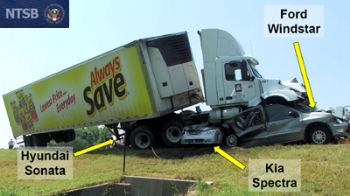Safety equals good business. According to the Federal Motor Carrier Safety Administration, the annual cost of commercial vehicle crashes to society is over $60 billion over $7 million for each fatal crash alone. That cost includes medical costs, emergency services costs, lost productivity and pain and suffering. A high profile crash can impact your reputation and relationships with exiting and new customers.
Current regulations require that a CMV driver while on duty may not have a blood alcohol level greater than 0.04. It has been suggested that people with untreated mild-to-moderate obstructive sleep apnea OSA can show performance degradation equivalent to 0.06 to 0.08 blood alcohol levels. CMV drivers are not allowed to drive intoxicated, but sleep apnea may be causing the equivalent effects. Also, experts in the field of sleep disorders believe that in most cases a person suffering from OSA is not aware of the condition and the only way it can be detected with complete certainty is through a sleep study. In addition, OSA is a highly treatable condition.
The treatment of OSA among drivers will reduce medical costs, insurance costs, absenteeism and increase driver retention.
The NTSB reports one large national carrier tracked over 300 hundred drivers during treatment for OSA and found a health care costs savings of $539 per month per driver, a reduction in preventable crashes by 30% and a reduction in the median cost of crashes by 48%.
Also, according to the National Sleep Foundation, after examining the insurance claims records of 156 truck drivers who received continuous positive airway pressure (CPAP) and other treatments for sleep apnea, researcher Dr. Benjamin Hoffman, found that health plan costs decreased by an average of $2,700 in the first year and another $3,100 in the second year. The study also tracked 92 drivers that did not get treatment for their sleep apnea diagnosis and found that their health cost remained constant.
FMCSA Bulletin to Medical Examiners and Training Organizations Regarding Obstructive Sleep Apnea
Probable Cause Fatigue
…driver’s fatigue, caused by the combined effects of acute sleep loss, circadian disruption associated with his shift work schedule, and mild sleep apnea, which resulted in the driver’s failure to react to slowing and stopped traffic ahead by applying the brakes or performing any evasive maneuver to avoid colliding with the traffic queue…
– NTSB

